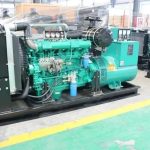Introduction
Outdoor events are a popular way to bring people together, whether it's a music festival, a wedding reception, a sporting event, or a community fair. One of the key elements to ensure the success of any outdoor event is a reliable source of power. In many cases, the location of outdoor events may not have access to the electrical grid, making diesel generators an essential tool for event organizers. In this comprehensive guide, we will explore the importance of diesel generators for outdoor events, their benefits, how they work, key considerations when choosing a diesel generator, maintenance tips, and best practices for using them effectively.
Importance of Diesel Generators for Outdoor Events
Diesel generators play a crucial role in powering outdoor events where access to the grid is limited or unavailable. These events require a reliable source of electricity to operate lighting, sound systems, food and beverage stands, ticket booths, security systems, and other essential equipment. Without a dependable power source, the event could be disrupted, leading to inconvenience for attendees and financial losses for organizers.
Benefits of Diesel Generators
Diesel generators offer several advantages that make them well-suited for powering outdoor events:
1. Reliability: Diesel generators are known for their reliability and durability, making them a trustworthy power source for outdoor events where uninterrupted power supply is essential.
2. Portability: Diesel generators are available in various sizes and configurations, making them easy to transport and set up at different event locations.

3. Fuel Efficiency: Diesel engines are more fuel-efficient compared to gasoline engines, providing cost savings in the long run, especially for events that require prolonged periods of power supply.
4. Low Maintenance: Diesel generators require minimal maintenance and have longer service intervals, reducing downtime and maintenance costs for event organizers.
5. 500kw diesel generator for remote mining sites : Diesel generators are capable of providing high power output, making them suitable for events with large power requirements.
How Diesel Generators Work
Diesel generators operate on the principle of converting diesel fuel into mechanical energy, which is then converted into electrical energy through an alternator. The basic components of a diesel generator include:
1. Diesel Engine: The diesel engine is the primary component of the generator that burns diesel fuel to produce mechanical energy.
2. Alternator: The alternator converts the mechanical energy generated by the diesel engine into electrical energy.
3. Fuel Tank: The fuel tank stores the diesel fuel that is used to power the generator.
4. Cooling System: The cooling system helps regulate the temperature of the engine to prevent overheating during operation.
Key Considerations When Choosing a Diesel Generator
When selecting a diesel generator for an outdoor event, there are several factors to consider to ensure you choose the right generator for your specific requirements:
1. Power Output: Determine the total power requirements of all equipment that needs to be powered at the event to select a generator with the appropriate power output capacity.
2. Fuel Efficiency: Consider the fuel efficiency of the generator to minimize fuel costs during the event.
3. Portability: Choose a generator that is easy to transport and set up at different event locations.
4. Noise Level: Select a generator with a low noise level to minimize disruptions to event attendees.
5. Durability: Look for a generator that is built with high-quality materials and components to ensure durability and reliability during the event.
Maintenance Tips for Diesel Generators
Proper maintenance is essential to keep diesel generators in optimal working condition and ensure reliable performance during outdoor events. Here are some maintenance tips to follow:
1. Regular Inspections: Conduct regular inspections of the generator, including checking fuel levels, oil levels, coolant levels, and any signs of wear or damage.
2. Routine Servicing: Schedule routine servicing of the generator as per the manufacturer's recommendations to keep it running smoothly.
3. Fuel Quality: Use high-quality diesel fuel to ensure optimal performance and prevent engine issues.
4. Clean Air Filters: Regularly clean or replace the air filters to maintain proper airflow and engine efficiency.
5. Proper Storage: Store the generator in a clean, dry, and well-ventilated area when not in use to protect it from environmental elements.
Best Practices for Using Diesel Generators Effectively
To maximize the efficiency and effectiveness of diesel generators at outdoor events, consider the following best practices:
1. Proper Placement: Position the generator in a well-ventilated area away from event attendees to minimize noise and exhaust fumes exposure.
2. Load Management: Distribute the load evenly across the generator to prevent overloading and ensure stable power supply.
3. Backup Plan: Have a backup generator or power source available in case of any unexpected issues with the primary generator.
4. Fuel Monitoring: Keep track of fuel levels and refill the tank as needed to avoid interruptions in power supply.
5. Emergency Preparedness: Develop an emergency plan in case of power failures or generator malfunctions to ensure the safety and well-being of event attendees.
Conclusion
Diesel generators are an indispensable tool for powering outdoor events, providing a reliable and efficient source of electricity in locations where access to the grid is limited. By understanding the importance of diesel generators, their benefits, how they work, key considerations for choosing the right generator, maintenance tips, and best practices for using them effectively, event organizers can ensure the success of their outdoor events while maintaining a seamless and uninterrupted power supply for attendees. Incorporating diesel generators into event planning can help create a memorable experience for participants and contribute to the overall success of the event.
